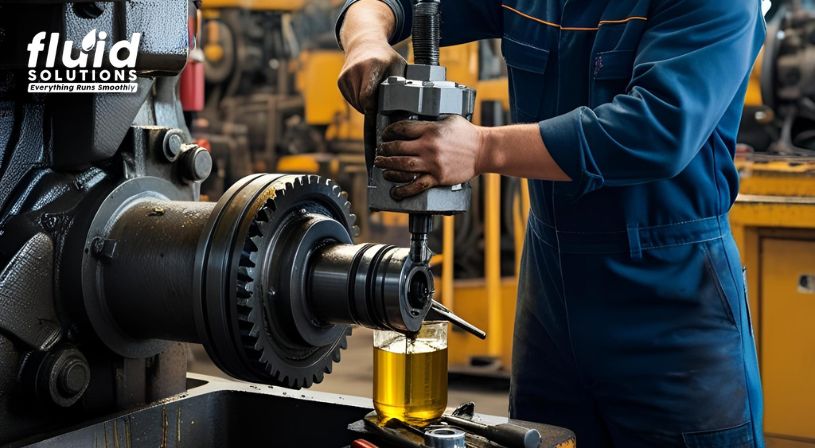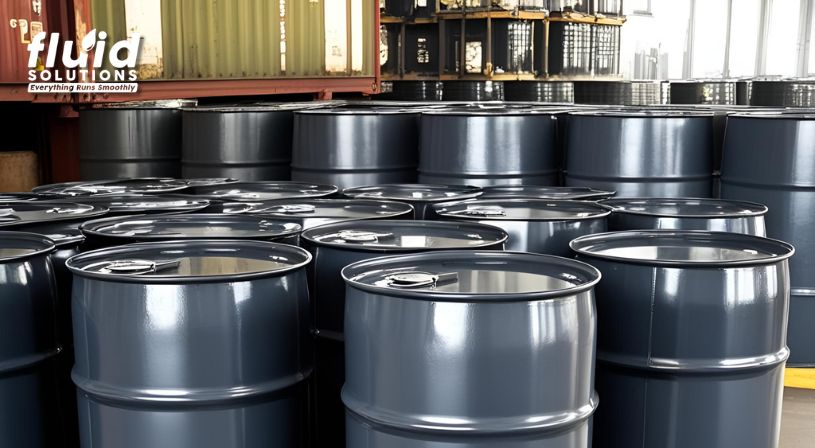
Industrial gear oils are essential in prolonging gear life and improving overall machinery efficiency. They also cool your gearboxes and prevent rust and corrosion, saving you from costly machine repairs.
Read this oil change guide to learn more about oil change intervals and how to choose the best gear oil change frequency based on your machinery type, usage, and operating environment.
Key Takeaways:
- Replace industrial gear oil every 3 to 6 months or based on usage and workload.
- High-load, 24/7, or harsh environments require more frequent oil changes.
- Synthetic oils last longer but cost more; mineral oils need more frequent changes.
- Look out for signs like dark, burnt oil, unusual noises, or overheating.
- Always follow manufacturer recommendations and inspect gearboxes regularly.
Standard Gear Oil Change Intervals
Different factors affect industrial gearbox oil change intervals. However, the common standards are based on time intervals and usage.
- Time-based maintenance indicates changing the oil at regular intervals regardless of machine use. Generally, the industrial gearbox oil change interval is between 3 to 6 months.
- Usage-based maintenance signifies changing the oil based on how the machines are operated. This maintenance schedule considers operation hours, distance traveled, and workload, and is better suited for heavily used machinery.
These standards for industrial gear oil changes are based on average conditions. However, this will still vary depending on different factors such as machinery type, usage frequency, and operating environment, among other things. Always check manufacturer recommendations for oil change frequency and perform regular gearbox inspections to ensure it runs in its optimal condition.
Key Factors That Affect Oil Change Frequency
Type of Machinery
- High-load machinery requires more torque to start and operate because it handles heavier loads and forces. As the gear oil is also subject to the same excessive load. Examples of high-load machinery are heavy conveyors and industrial presses.
- Low-load machinery has lighter mechanical stress on the lubricant during startup and operation. They also use less energy and thus longer gear oil change intervals are appropriate.
Frequency of Use
- Constant operation: Machinery that runs 24/7 requires more frequent gear oil changes because oil degrades faster due to mechanical stress and continuous heat exposure.
- Occasional usage: Gear oil change frequency for backup, standby, or occasionally used equipment is less frequent They require semi-annual or annual oil changes to prevent oxidation and maintain the quality of gear oil during downtime.
Performing oil analysis can provide insight into when to change the gear oil of infrequently used machines.
Operating Environment
The environment where machines operate also affects industrial gearbox oil change intervals. Dirty and dusty environments increase the risk of oil contamination, so frequent gear oil changes are necessary.
High moisture environments also require frequent oil changes as moisture accelerates rust formation, corrosion, and oxidation. Moreover, water contamination of machine lubricants causes acid and sludge formation, affecting the quality of your gear oil and machinery efficiency.
Lastly, machinery operating in high or fluctuating temperatures require more gear oil changes. Oil life significantly shortens when exposed to extremely low or high temperatures. Oil thickens and stops flowing at low temperatures, while rapid oil oxidation happens at high temperatures.
Type of Gear Oil Used
The type of gear oil used in machinery also affects gear oil change frequency. There are two main types of gear oils – mineral-based and synthetic-based.
- Mineral gear oil is cheaper upfront but requires frequent oil changes as it is more susceptible to degradation if exposed to fluctuating temperatures.
- Synthetic gear oil has stable viscosity and flows across a wide temperature range. Hence, it allows for longer intervals between gear oil changes. However, it is more expensive than mineral gear oils.
Other factors that affect intervals between gear oil changes are the additives in lubricants. Some additives have anti-wear and antioxidant properties, which reduce the frequency of oil changes. Check the product datasheet to know which additives are included in the gear oil.

Signs That Your Gear Oil Needs Changing
Besides keeping a schedule for your industrial gearbox maintenance, you should also watch out for these signs that your gear oil needs changing.
- Changes in color or consistency: Fresh oil is typically clear or amber. If it turns dark and smells burnt, the oil has already oxidized or is contaminated. Hence, it needs changing. Furthermore, if the gear oil exhibits visible metal particles or sludge, it has already degraded and requires an oil change.
- Unusual noises or vibrations from the gearbox: If your gearbox is making grinding or clunking noises, it might indicate that the oil needs changing. These sounds occur because the oil may be contaminated. Whining sounds also indicate your machine has already run out of transmission fluids and requires fresh and correct gear oils.
- Overheating or reduced efficiency: A gear oil change is necessary if your machine is hotter than usual. Overheating happens when the gear oil is insufficient, resulting in increased friction and heat buildup in your gearbox.
Similarly, it is necessary to change the gear oil if the gears are sticking or slipping, or the power transmission is dropping.
Recognizing the signs that your gear oil needs replacement can improve machinery efficiency, extend its lifespan, and help you avoid costly repairs.
Partner with Fluid Solutions for Reliable Gear Oil Supply and Support
A timely gear oil change is essential to the reliability and safety of your machinery. It also minimizes costly repairs and machine failure. Hence, it is important to maintain a consistent oil change schedule and know the signs when gear oil needs changing.
Our expert partners at Fluid Solutions offer guidance on oil selection and change intervals. We also offer high-quality gear oils to ensure the longevity and efficiency of your machinery.
Contact Fluid Solutions today at (02) 8370 5928 / (0917) 844 9156 or via email at inquiry@fluidsolutions.com.ph to find out how we can support your preventive maintenance needs.
Social Media Links:
Facebook: https://www.facebook.com/fluidsolutionsinc
LinkedIn: https://www.linkedin.com/company/fluid-solutions-inc


